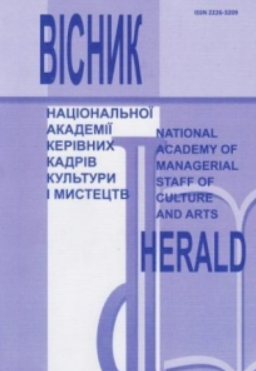ВПЛИВ ІСТОРИЧНИХ ПОДІЙ НА ФОРМУВАННЯ РОМСЬКОЇ КУЛЬТУРИ В КОНТЕКСТІ СОЦІОКУЛЬТУРНОГО ПРОСТОРУ УКРАЇНИ ХХІ СТОЛІТТЯ
THE INFLUENCE OF HISTORICAL EVENTS ON THE FORMATION OF ROMA CULTURE IN THE CONTEXT OF THE SOCIO-CULTURAL SPACE OF UKRAINE IN THE XXI CENTURY
Author(s): Оlexandra RudnitskaSubject(s): Cultural history, Social history, Cultural Anthropology / Ethnology, Pre-WW I & WW I (1900 -1919), WW II and following years (1940 - 1949), Transformation Period (1990 - 2010), Present Times (2010 - today), Inter-Ethnic Relations, Ethnic Minorities Studies, Politics and Identity
Published by: Національна академія керівних кадрів культури і мистецтв
Keywords: Roma culture; history of Roma; Roma of Ukraine; historical events; servu; Ruska Roma; lovari; integration of Roma culture; mega-group "dom"; socio-cultural space of Ukraine of the XXI century;
Summary/Abstract: The purpose of the article is to determine and explore the relationship and interaction of historical events (Russian Revolution of 1917 and its consequences; World War II (1939-1945); anti-Roma policy of Nazism and the Holocaust; the collapse of the USSR) on the formation of Roma culture in the context of socio-cultural space of Ukraine XXI century. The methodology is based on the use of historical, socio-cultural methods to reveal the historical truth in the formation of Roma culture in different chronological periods. The scientific novelty is that for the first time in chronological order the relationship and interaction of historical events of the ХХ century (the Russian Revolution of 1917 and its consequences; World War II (1939-1945); anti-Roma policy of Nazism and the Holocaust; the collapse of the USSR) and the formation of Roma culture in the context of the socio-cultural space of Ukraine in the XXI century, determines the origin, formation, current state, and influence of Roma art on the development of Ukrainian culture of the XXI century. Conclusions. Historical events, from ancient times to the present, including the Russian Revolution of 1917 and its consequences, World War II (1939-1945), anti-Roma policies of Nazism, the Holocaust, the collapse of the USSR, had a relationship and decisive influence on the formation of Roma culture in the context of the socio-cultural space of Ukraine of the XXI century. The first Holodomor became a motive for strengthening the Ukrainian national consciousness, the settlement of Roma on the territory of Ukraine, and uniting the joint efforts of Ukrainians to resist the Soviet government. During the Second World War, the Roma did not lose their optimism and thirst for creativity, raised the fighting spirit with military songs, dances, and amateur front-line concerts. It was emphasized that a significant number of Roma were killed in the punitive actions of the Nazi occupation regime in Ukraine. In the middle of the twentieth century, no book in the Romani language (neither artistic nor scientific) was published in the USSR, and Romani schools were closed. The development of Roma culture was formal. After the collapse of the USSR, Roma artists were able to tour freely around the world and integrate their culture without any fear of oppression of their creative activities, continuing their development in the socio-cultural space of Ukraine in the XXI century.
Journal: Вісник Національної академії керівних кадрів культури і мистецтв
- Issue Year: 2020
- Issue No: 4
- Page Range: 51-55
- Page Count: 5
- Language: Ukrainian

